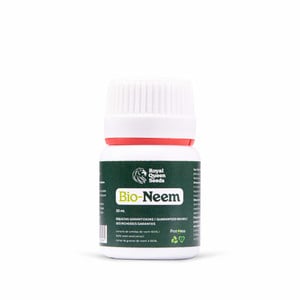.

Protect Your Cannabis Plants Against Root Aphids
Growing cannabis brings joy to the soul, but it's not without its problems. Many species of pests love cannabis, including root aphids. These critters have an appetite for the root sap, and they cause yellow leaves and slowed growth. Find out how to detect them, how to treat infestations, and how to prevent their return.
Contents:
Growing cannabis comes with a host of benefits. The act of tending to your plants brings about a state of inner peace and smoking your flowers offers serious satisfaction. But make no mistake, cultivating the herb also means a set of challenges, including pest infestations. Root aphids are one of the biggest threats to cannabis plants and can strike in any growing environment. These pests leech nutrients out of cannabis roots—a vital anatomical component needed for nutrient and water uptake. Despite their small size and unintimidating demeanour, these critters can cause a lot of damage and, ultimately, reduce yields.
To take on root aphids, we recommend following the advice of the ancient Chinese general Sun Tzu who famously advised strategists to “know thy enemy”. Below, you’ll learn everything you need to know about root aphids—how to detect their presence, how to treat affected plants, and how to prevent attacks altogether.
What Are Root Aphids?
If you’ve grown cannabis before, or any plant for that matter, you’ve probably come across aphids. These ravenous creatures have quite the appetite for the sap in leaves and stems of brussels sprouts, kale, and other veg. However, these common pests differ slightly from root aphids, which linger under the soil line and feed on sap from the roots of cannabis and other edible crops.
The rice root aphid (Rhopalosiphum rufiabdominalis) proves especially problematic for cannabis plants. This species is dark green and has a round body shape. They share an almost identical appearance to above-ground aphids. However, their darker colour and shorter legs and antennae help identify them.
Root aphids start their life off without wings, and many of them never develop them at all. However, once the population grows too large or the plant becomes too destroyed, members of the colony will develop wings, migrate to a new host plant, and lay the foundation for a new colony.
This species attacks cannabis plants frequently, and in the United States entomologists receive queries[1] about this pest on a daily basis. But root aphids don’t only go after cannabis. You might also see signs of their presence in your squash and pepper plants.
Don’t mistake them with root maggots, which are the larvae of several species of root maggot flies. They chomp on cannabis roots and can also cause serious damage.
How to Detect Root Aphid Damage
Now you know that these aphids like to linger in the root zone. But what exactly do they do there? Simply put, they feast! These pests possess specialised mouthparts that allow them to penetrate roots and suck out sugar-rich sap.
As you’re aware, plants depend on their roots for survival, since they work to uptake vital nutrients and water. They also act as an interface with beneficial biology within the soil. Cannabis plant roots form relationships with species of bacteria and fungi. These organisms provide freeform nutrients, and plants give them sugars in return. However, a root aphid invasion disrupts these important processes.
It doesn’t take long for them to inflict damage; rice root aphid population can double every 1.6 days (in optimal conditions). Oh, and root aphids don’t just lurk in the soil. They have a wide host range and are also frequently found on cannabis plant roots grown in hydroponic and aeroponic systems, both indoors and outdoors.
What does a root aphid invasion look like? The first tell-tale signs are yellow leaves and slowed growth—symptoms suggesting that your plants aren’t getting all of the nutrients they need from the soil. If you spot these signs, and you've established that your feeding regime and pH are not to blame, you’ll want to take a closer look at the root zone.
Gently dig down into the soil near the stem until you uncover part of the root ball. If your plants are under attack, you’ll notice white and waxy covering over the roots—a classic sign of the species’ presence. You might also come across high levels of ant activity near the base of your plants, as they feed on the honeydew that root aphids excrete.
If you spot the signs of a root aphid infestation, fear not! Find out how to treat your plants and prevent the species from attacking again in the future.

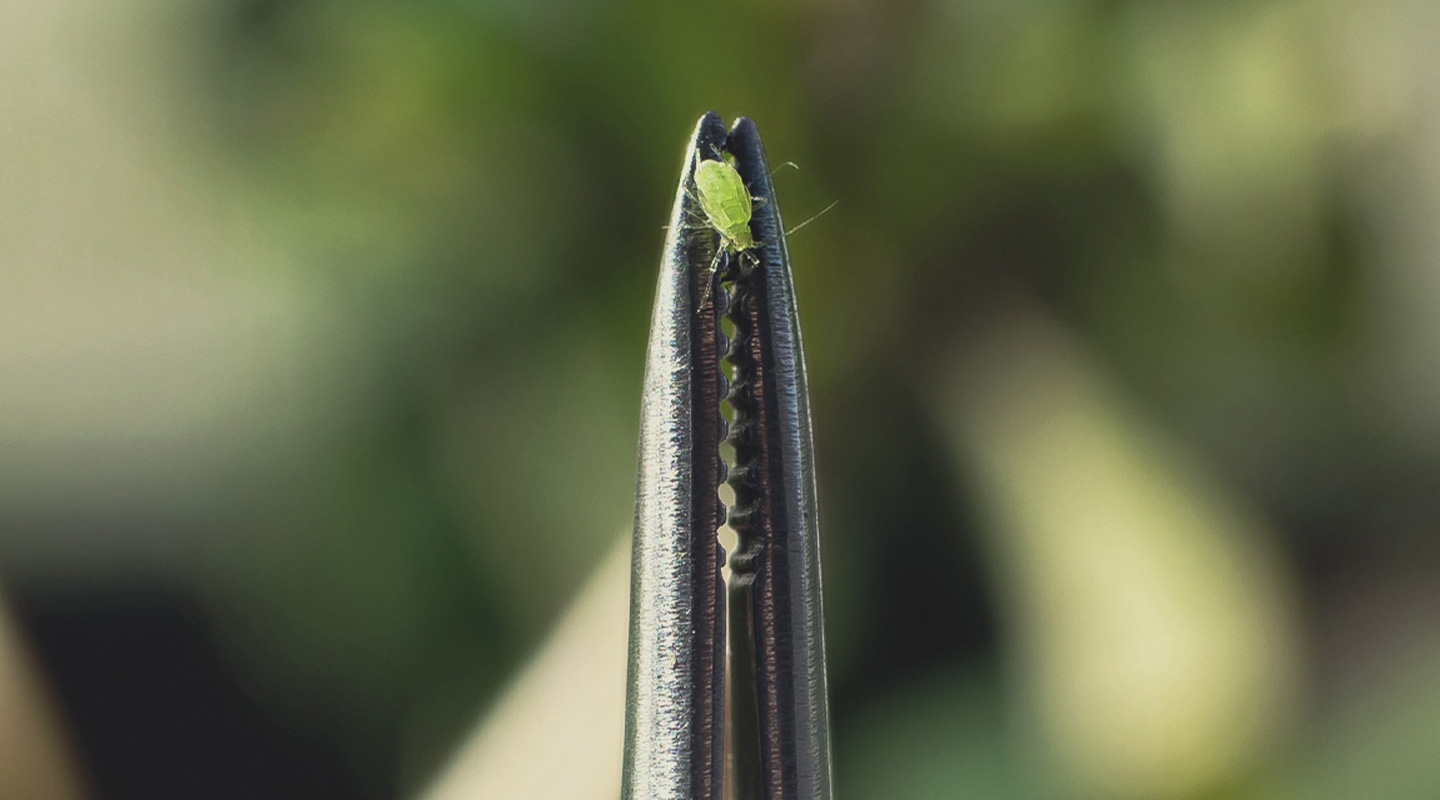
How to Treat a Root Aphid Infestation
Root aphids can cause real issues in the cannabis garden or grow room. Thankfully, there are several methods that work quite well in treating infestations. If you're wondering how to kill root aphids, check out some of the most effective techniques below.
-
Conventional Pesticides: Are They Worth It?
Some cultivators reach straight for a bottle of pesticide to eliminate root aphids. These products are designed to kill insects, after all. Neonicotinoids such as imidacloprid attack the central nervous system of insects and do a good job of wiping them out. Insect growth regulators that contain fenoxycarb keep insects locked in their juvenile stage and prevent them from developing.
Although effective, these methods are not organic. These chemicals can work their way into your finished product, damage beneficial insect life in your garden, and spill out into your local environment. At Royal Queen Seeds, we love the organic approach that benefits the grower and the environment. Check out the options below for nature-friendly alternatives.
-
Nematodes
Have you ever heard of nematodes? These worm-like creatures help to make up the soil food web. Researchers believe there are over 25,000 different nematode species. While some of these attack plant roots, others actively hunt and kill root zone pests. Known as entomopathogenic nematodes, these microscopic allies kill insects such as root aphids by entering the guts of the larvae. You can purchase these root aphid killers from most plant outlets and growing shops.
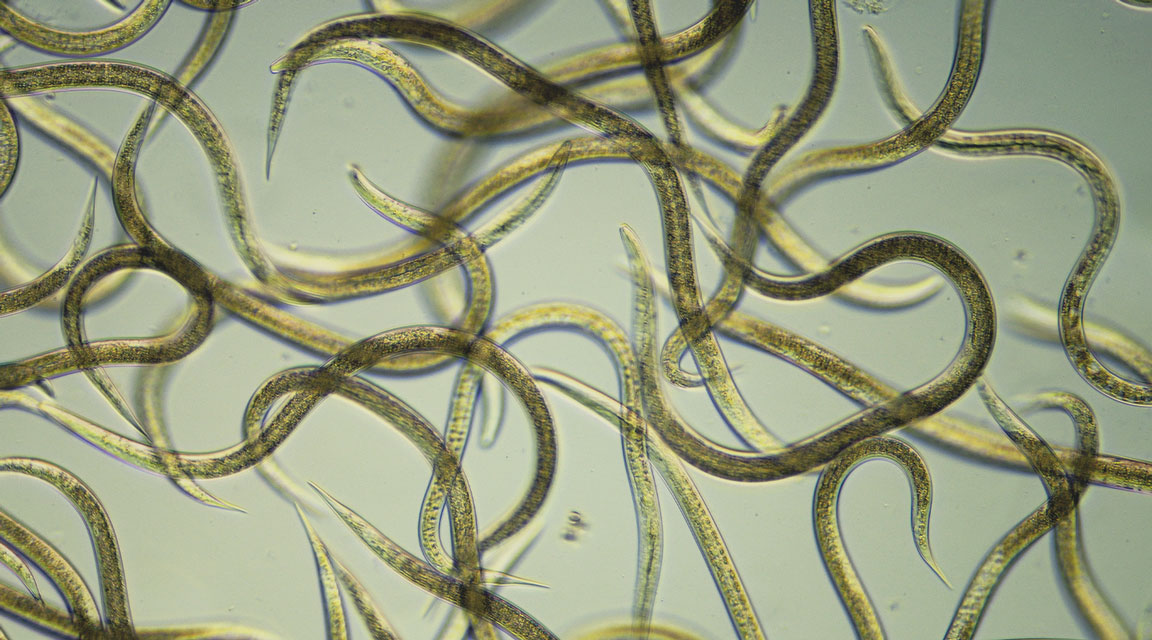
-
Fungi
Some fungi also have an appetite for insects. The species Beauveria bassiana grows naturally in the soils of the world and prevents certain insect populations from growing out of control. It targets arthropod pests such as aphids and causes white muscardine disease. You can purchase some garden preparations that feature this fungus as an active ingredient.
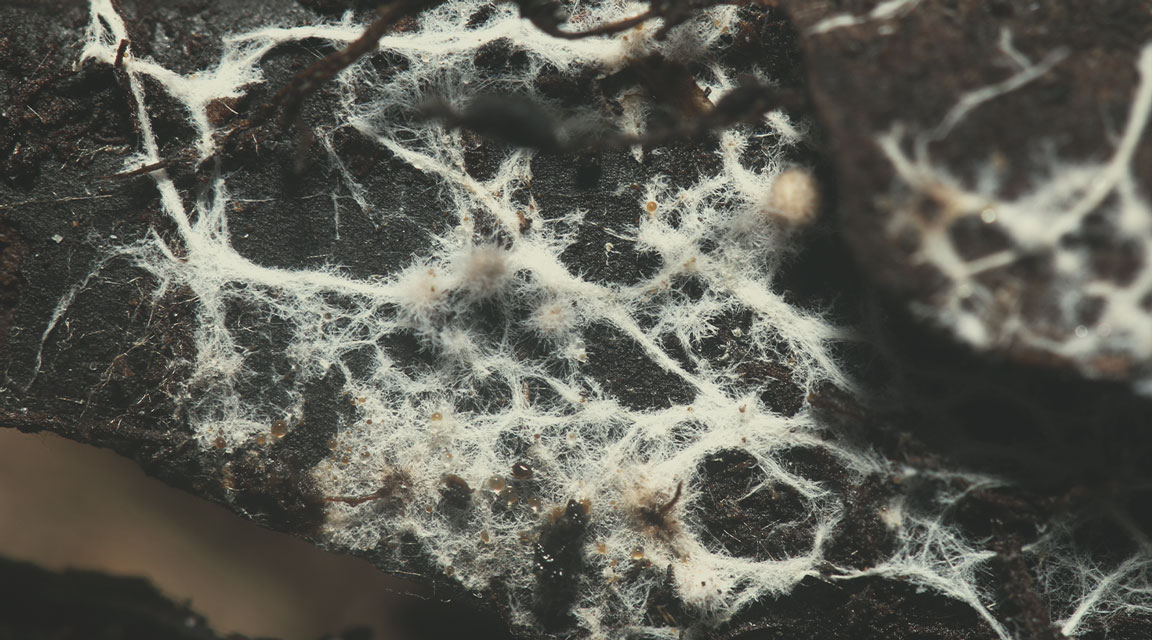
-
Neem Oil
Trusty neem oil also serves as a weapon against root aphids. It contains the natural pesticide azadirachtin that works as an antifeedant, repellent, and insect growth regulator. Apply as a root drench according to the product's instructions.
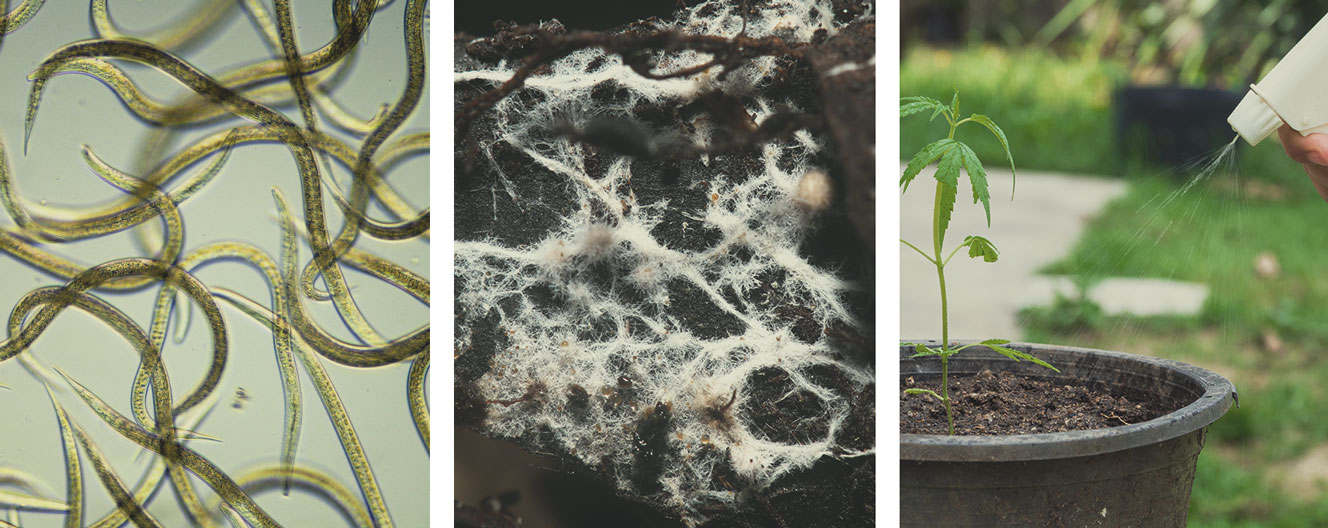
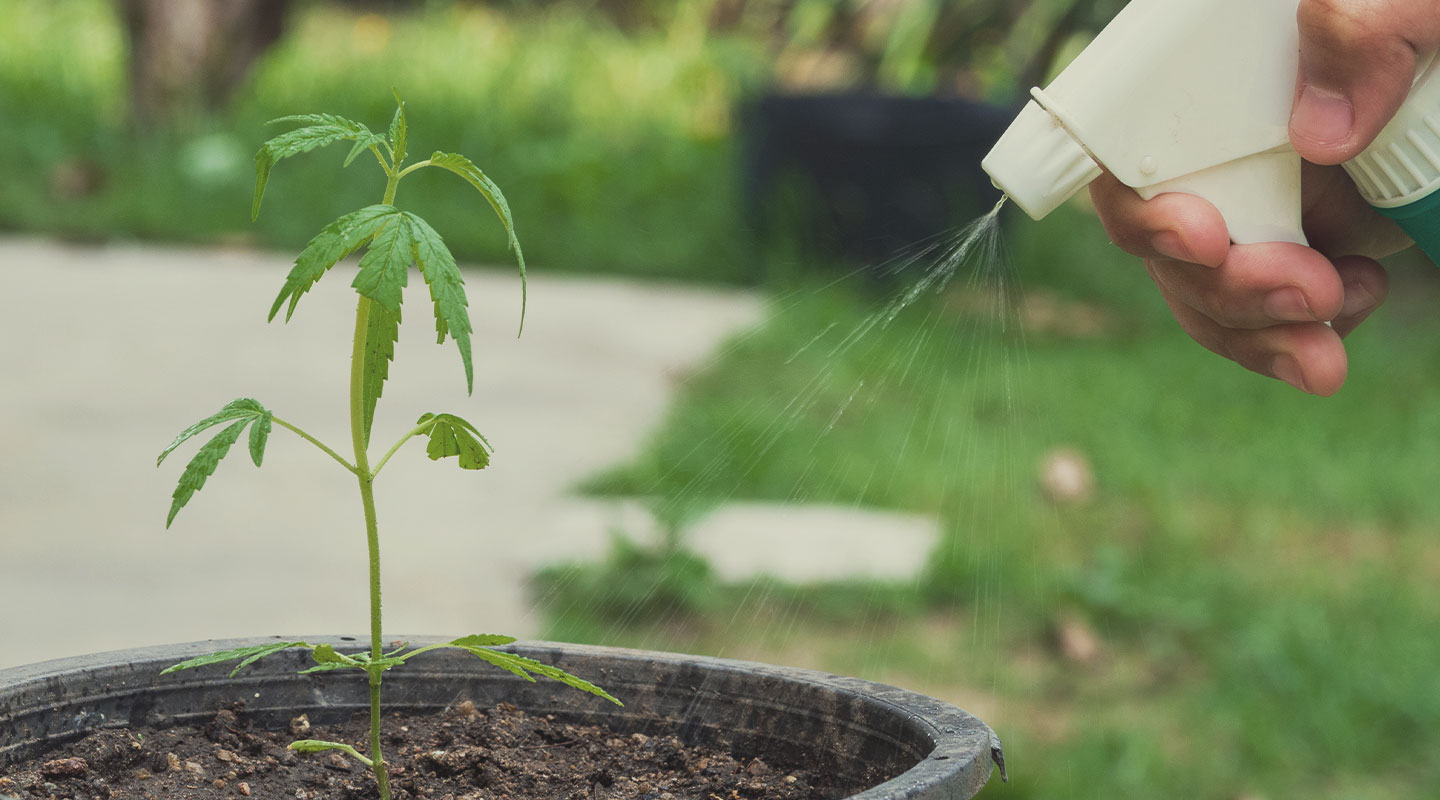
How to Prevent Root Aphid Damage When Growing Cannabis
Root aphids can strike just about anywhere, from indoor hydroponic grows to outdoor garden beds. While treatments are sometimes effective when dealing with an infestation, there are a few steps you can take to help prevent this pest altogether.
-
Keep Your Tools and Environment Clean
Make sure you sterilise your gardening equipment and reusable containers, and that you keep your environment spotless. Avoid cross-contamination from other plants, especially if you notice the problem in any of your plants.
-
Pre-Emptive Measures
Entomopathogenic fungi and nematodes are great at taking down root aphid larvae. If you think your plants are at risk, why not simply add these lifeforms to your soil? Doing so will introduce a microscopic patrolling force that might help repel an invasion.
-
Sticky Traps
Yellow sticky traps can help identify early signs of a root aphid problem. Lay them down over your garden and grow room and check them regularly. If you notice any root aphids stuck to the traps, proceed with the treatments above as soon as possible to minimise any damage.
-
Be Proactive
Vigilance is key! Check your plants’ roots from time to time for any signs of root aphids. This way you might be able to catch an infestation before it makes visible damage.
- Rice Root Aphid: An Insect Surprise on Indoor-Grown Cannabis https://entomologytoday.org


























